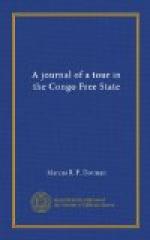At 2.30 p.m. a bugle sounded and a chattering throng of natives hurried past the Inspector’s house towards the beach to resume work, which is always interrupted for three hours at 11.30 a.m. during the heat of the day. In order to feed these people and the soldiers of the Force Publique at Leopoldville, about a ton and a half of kwanga is prepared every day from the manioc grown in the villages around, and every able bodied native has to contribute his or her quota of work. Each person indeed is supposed to work for at least forty hours each month, and whether engaged on roads, buildings, or other public work, or in collecting rubber, wood for the steamers, or kwanga for food, is paid at the current rate. The principle of the system of Government, although entirely novel, is undoubtedly sound and suited to the country and the condition of the native. The whole territory is divided into two great parts, the lands of the native chiefs and the vacant lands called here the Domaine Prive. The Government has however, disposed of part of these to Concessionary Companies in this sense, that the Companies have the right to exploit all the products of the forest in these areas. Other portions have been leased to Missions, to Commercial Houses and to private people. The Government collects the rubber, ivory, food stuffs, and other produce from the Domain Lands and with the proceeds, constructs roads, navigates the rivers, maintains the Government and army and generally develops the country and civilises the natives.
Trading relations are formed with the chiefs as follows: Agents are sent into their districts with brass wire, cloth, salt, beads, or other things likely to attract the natives, and these are exchanged for rubber, ivory, gum copal, manioc, fish, fowl or other produce; thus the value of rubber, ivory or any other substance is determined in terms of brass wire, cloth or salt and so its value in sterling. Similarly, the value of native labour is discovered and the native paid accordingly. The brass wire is cut into lengths called mitakos, this form of currency having been introduced by the late Sir H.M. Stanley. The length of the mitako, and so its value, varies in different parts of the country. At present there seems to be no limit to the amount of wire cut into mitakos, but as the natives use great quantities to make brass rings for the arms and legs of both sexes, it is difficult to say to what extent the currency is being debased. The pay of skilled labour here is high, and unskilled workers receive about as much as similar labourers in India. The natives pay no taxes in money or its equivalent, but instead are compelled to do this 40 hours’ work per month for the State.




